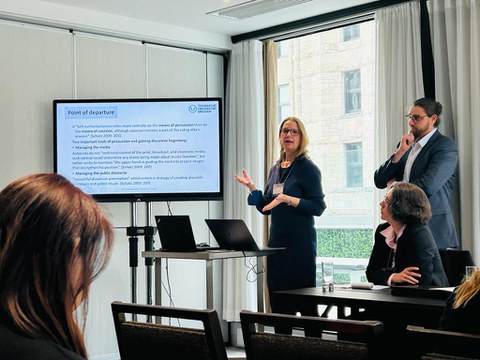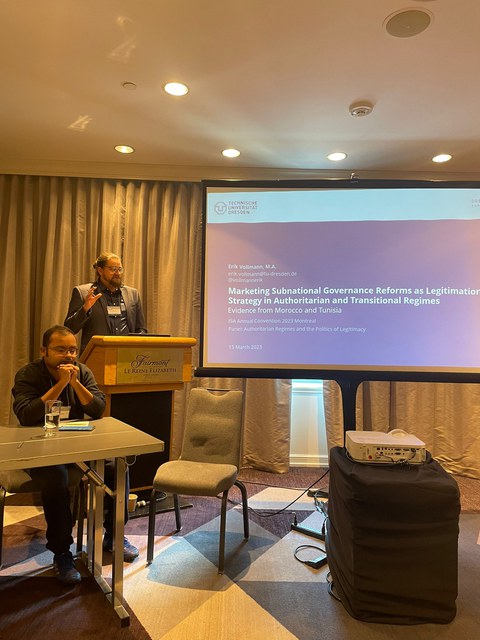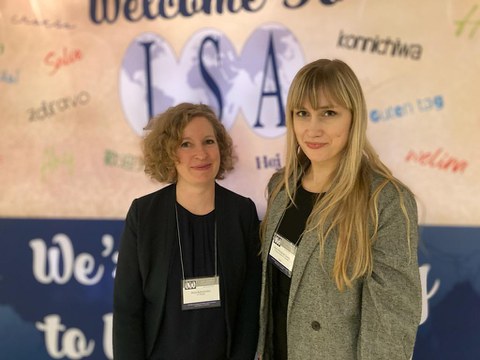Mar 28, 2023
Strong Presence of TU Dresden at ISA 2023 in Canada - in Exchange with Scholars from all over the World
From 15 to 18 March 2023, the annual conference of the International Studies Association (ISA), one of the largest interdisciplinary conferences on international, transnational and global affairs, took place in Montreal, Canada. This year, the Institute of Political Science at TU Dresden is strongly represented with a total of four participants: Prof. Dr. Marianne Kneuer and Erik Vollmann from the Chair of Political Systems and System Comparison as well as Prof. Dr. Anna Holzscheiter and Maria Weickardt Soares from the Chair of Political Science with a focus on International Politics participated in the programme. Dr. Laura Pantzerhielm was also supposed to attend and present her research, but she was unable to make the trip due to the strike at the Berlin airport.
Already on the flight to Montreal were numerous other academics, some of whom were still finalising their papers and presentations for the conference – already a foretaste of the approximately 6000 academics from all over the world and numerous panels.
On the panel "Authoritarian Gravity Centers and image management: how autocrats use soft power", sponsored by the International Political Science Association and organised by Marianne Kneuer, Prof. Kneuer and Erik Vollmann presented their research on "Managing the media and shaping the messages. Soft power mechanisms of authoritarian regimes for gaining discursive hegemony". The two TUD researchers conceptually examine how autocracies try to influence the media landscape and public discourse in their favour beyond classical repression. They presented findings on the two autocratic centres of gravity, Venezuela and Saudi Arabia, which also exert influence on their regional environment.
Erik Vollmann also discussed his research on "Marketing Subnational Governance Reforms as Legitimation Strategy in Authoritarian and Transitional Regimes: Evidence from Morocco and Tunisia". Vollmann shows how decentralisation reforms are used by regimes for self-legitimation and how government-related media frame these achievements. In the process, the transition from strong authoritarianism under Ben Ali in Tunisia (until 2010) to the democratisation processes after the Arab upheavals can be traced, as well as a narrowing of the political space during the re-autocratisation since 2021. In Morocco, strong changes in the decentralisation narrative away from framing as democracy towards shaping a self-confident Moroccan model for development can be observed. This goes hand in hand with a discursive shift away from Europe towards Africa, in which Morocco emerges as a teacher of local democracy.
Prof. Holzscheiter presented her joint research with Dr. Pantzerhielm on "Political (Self-)Representation of Marginalised Groups in Global Institutions: Youth Representation in Global Health Policy-Making During the COVID-19 Pandemic". She exposed how multiple barriers and intersecting inequalities condition young peoples’ encounters with exclusive spaces of global health policy-making and points to the reflective and ambiguous ways in which young people embrace, enact and question ‘youth’ as political category. She criticised an overemphasis on the ‘marketplace’ of representative claims and an idealized view of representation as neatly separable form other social practices, rather than engaging young people holistically and meaningfully in policy-making processes.
In addition, Prof. Holzscheiter and Maria Weickardt Soares presented their current research on "Discourse Networks in Health Data and Biobanking Governance: Explaining Policies on the Global Circulation of Human Specimens and Data". The panel focused on methods, measurement and data in research on international organisations. Using biobanking as a case study, Weickardt Soares and Prof. Holzscheiter addressed the lack of international regulation and standard-setting in the field of global health.
The TUD scientists were pleased about the interest in their research and also received some input for their further research. For some, it was the first major conference they had attended since the pandemic. Thus, the ISA offers an excellent opportunity for networking and scientific exchange. In terms of content, a wide range of topics was covered, from health research to political sociology, climate and conflict research to migration and much more.




